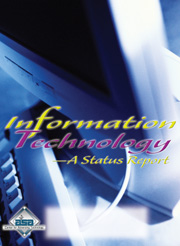

Supply House Times: Please give us a status report on the ASA Database project. Where does it stand now compared with a year ago, and tell us why cooperation among both wholesalers and manufacturers seems to be to no one's liking.
Price: The ASA Database project is now in what we're calling a "Pre-Release" phase. What this means is the database, which is branded as the IDB for Industry DataBase, is being installed on a limited basis to a group of selected distributors who have agreed to be our beta testers. This will allow us to perfect the various procedures required to deliver and maintain the IDB. Some of the issues that will be addressed are: selecting the particular manufacturers that a distributor wants included in their version of the database, building the initial load of product data, and setting up the maintenance routine to update the files. We are developing all of these procedures so that the participant's needs can be supported via our Web site. Adding new product lines, downloading manufacturer updates - actually all of the activities associated with the IDB project - will be accessible through the www.asaidb.com Web site. On the issue of cooperation, I see it improving. Since the ISH North America event in Toronto we have seen a lot of interest in the project from both manufacturers and distributors. I believe the case we made for a centralized database was well received and accepted. We are hosting online seminars every two weeks that describe the details and benefits of the IDB and both manufacturers and distributors are responding.
Supply House Times: Please give us something like an annual report about where ASA's members stand in adapting technology to their operations, compared with last year at this time and compared with other industries that you're aware of.
Price: The ASA membership has done a great job in the last 12 months continuing to apply technology solutions to the real business challenges they face daily. Even with the slow state of the economy, tech projects are being planned, budgeted, and accomplished - though at a "measured" rate. I think the extra scrutiny that these projects must pass is a positive response to the economic times; with tighter IT budgets, more thought and effort is going into the design and scope phase of the process before a project is launched. This can only help the development teams to more accurately hit their targets related to budget, performance, and delivery schedule. Some of the projects that I'm aware of include several EDI installations, CD-ROM based product catalogs, Web sites to promote distributors' businesses, and the use of PDAs (such as Palm Pilots) to connect field personnel with their home offices.
Supply House Times: At the Supply Chain Summit at last year's ASA Convention, one audience member said something that rings in my ears. He said, "None of us is convinced that EDI is a cost saving." How do you respond?
Price: EDI is a demonstrable cost savings effort - period - and more companies than ever are convinced of the savings. I'm happy to report that as this article goes to press, we now have more than 160 member companies trading over ASA's AnsiNet EDI service, and we continue to grow with four to five new participants each month. Whether the savings is of the more immediate type such as an extra discount for those using the EDI route, or is passed on from manufacturer to distributor due to fewer errors, reduced order entry staffing, etc., it can be a real savings. I remember your December 2002 editorial "Quick Takes on the Supply Chain Summit" makes mention of that wholesaler's comment, which was then followed by a discussion of the complexities of EDI, particularly dealing with special circumstances. If 75% of your business is "off the shelf stock" and you use EDI for those purchases only, you can still realize a significant savings. Regarding special pricing or other circumstances that can affect an order, we need to remember that orders sent via other methods can also become exceptions to the normal process. Orders sent by fax will also need to pass through the manufacturer's order-release process and exceptions to the rule such as discounted pricing beyond the norm can delay a faxed order, just as quickly as an order sent via EDI. The key to efficient order processing is to anticipate for and plan to handle factors that affect the path an inbound purchase needs to take.
Supply House Times: Allow me to play devil's advocate. Depending on where a wholesaler may stand with his computer system, getting up-to-speed technologically might indeed entail a huge investment. Not only in direct cost of hardware and software, but in training time and the learning curve. With margins squeezed from every direction, can you blame wholesalers for not getting "with it" as a top priority?
Price: Investing in technology should be no different than other capital expenditures that face distributors today. Your warehouse premises, delivery truck fleet or product showrooms all require substantial outlays of funds to acquire and maintain in good working order. I'm not advocating you need to be on the bleeding edge of the latest technology advancements, but just like your delivery trucks, the in-house computer system needs to be able to handle the load, and efficiently move the business data from the front lines to the back office. Regarding personnel training, every dollar spent on learning how to "do it right," must be looked at as money well spent when you consider the alternative is to repeatedly pay for costly mistakes. Also the tools available in modern distribution packages are great timesavers at tasks such as receiving inventory, processing returned goods, and purchase reconciliation, just to name a few. If "Time is Money," then you'll save a bundle by upgrading your systems. Technology investment is one critical factor in the health of the independent distributor. With the declining trend in the number of privately owned wholesalers you have to ask the question: How many of these companies fell behind the curve on updating their critical systems such as technology, personnel and facilities?
Supply House Times: Most technology discussions concern EDI communications between wholesalers and their vendors. Where do things stand with wholesalers and their customers, be they contractors, builders, industrial clients, etc.?
Price: The short answer is that EDI is not a 'plug & play' technology like e-mail or Web-based order forms. There are demands such as document formatting and product data synchronization that would require the typical contractor to invest more than he would get back in convenience or time savings. Even with distributor - manufacturer relationships, the real value of EDI is achieved only when a substantial volume of transactions is sent through this 'e-pipeline'. However, as always, new technologies are breaking down current barriers. A new standard called XML promises to join the ease of the Web-browser to the efficiency of machine-direct transactions. XML accomplishes this by identifying pieces of data with individual 'tags' rather than where the data is found in a rigid file format. This could bridge the gap between rigid EDI and free-form e-mail.
Supply House Times: What kinds of tangible assistance does the ASA CAT offer member wholesalers in helping them adopt better technology? Do you have any plans for future offerings? (It seems many wholesalers need a lot of handholding when it comes to computers.)
Price: The Center for Advancing Technology's mission is to improve the productivity of ASA members by promoting standards and solutions for the PHCP industry. We try to accomplish that in several ways. First, members can call the Tech Center toll-free (800-608-7308) with any tech-related question they may have. The Center has a number of resources to draw upon to get the latest information into the hands of our members. Also, we have several well-known programs that have been introduced to answer specific needs in the industry, such as our Source ASA+ electronic catalog, the new IDB Industry Database, and the aforementioned EDI services through ASA AnsiNet. All of this information can be found on our Web site at www.asa.net/tech.
Supply House Times: How much do you interact with Prophet 21, NxTrend, Eclipse, Mincron, TradePower, Dimasys, Management Software Systems and other purveyors of distribution software? Do all their products blend seamlessly with what ASA is trying to achieve?
Price: A number of the major distribution software companies work with the Tech Center. Most of these companies exhibit in the Center for Advancing Technology's "Tech Pavilion" at the national convention as they did recently as part of ISH North America in Toronto. Regarding integration of our projects with their systems, many of these companies serve on volunteer committees tasked with the formation of services such as our EDI Express Standard EDI Document set, and the new IDB Industry Database. This ensures that these new projects will work with the installed software packages that our distributors have.
Supply House Times: Please discuss anything I haven't asked about that you consider important.
Price: As we move into 2003, the potential for economic change seems close at hand. The real question is in which direction will the economy move?
Published reports state that businesses are starting to free up funds for technology-related projects, and that reinvesting in businesses to reduce costs and increase efficiencies is gaining momentum, and we've seen this firsthand with all the interest in services like the new IDB Industry Database. I think these are good signs for the business climate in general and our industry in particular. Many of the pressures we're all experiencing, both as manufacturers and distributors - such as escalating costs and thin margins - these can be addressed or at least mitigated by applying the available tools afforded us by modern distribution technology. <<
Kevin Price is director of the American Supply Association's Center for Advancing Technology. The mission of the Center is to promote technology standards and solutions with the ASA membership, and the greater PHCP industry. Price brings more than 20 years of industry experience and technical expertise to the director's position. He can be reached at kprice@asa.net or 800-608-7308.

SIDEBAR: Plumbers & Factory Supplies Upgrades Technology
Plumbers & Factory Supplies is a 70-year-old single location family-operated business based in Columbus, Ohio. "When I reflect on the past it seems we have always been responding to the 'new technology of the future,'" said Tom Reynolds, executive vice president. "It comes down not to whether we do it, but how soon we implement and update our business capabilities through the use of 'new technology.' I remember visiting the company offices as a kid and recall a large metal 'posting machine.' I'm sure it represented the 'high tech' of the times."Plumbers & Factory's most recent leap in technology was to upgrade its in-house computer system, which according to Reynolds placed the company on an even playing field with its competitors. By itself the move provided operating efficiencies and established a stable foundation from which to expand into additional technology supported capabilities.
As the Internet has become more important as a conduit for information sharing, Plumbers & Factory has increased to a dedicated high-speed connection to the Web. This fractional T1 line is used for Internet-based training and accessing product information from the Source ASA+ Web site.
Looking forward, Web Order Entry is the next project to be launched. Reynolds considers implementing practical technology coupled with his valuable staff of "good people" as the factors that keep Plumbers & Factory Supplies competitive and profitable.

SIDEBAR II: Todd Pipe Practices Judicious Implementation Of Technology
Mark Grantham, director of e-business development for Todd Pipe and Supply (Supply House Times' 2002 Wholesaler of the Year; see December 2002 issue) discussed how technology works for this California-based, 9-location wholesaler. Mark says that Todd Pipe's approach to technology has been one of "judicious implementation," but in review you will find that they are employing some very up-to-date offerings.To begin with, every employee who accesses the main computer does so not with a "dumb" terminal, but rather with a relatively new Dell PC complete with Microsoft Office programs and Internet Explorer. This also applies to the counter area.
Even customers are getting into the act. Todd is placing PCs on the 'Will Call' counters for customers' use. Customers will be able to use these computers to write their own orders for pickup at the 'Will Call' counter. To keep employees in touch with customers and the branches, Blackberry handhelds (a combination pager and PDA - Personal Digital Assistant) are used extensively by Todd's mobile employees, and Nextel phones are used effectively by everyone in the company.
On the Internet, Todd customers will find the company's Web site, www.toddpipe.com, which includes an e-commerce section for Web order entry and online product catalogs powered by Source ASA+. Todd also does EDI with ASA AnsiNet and uses an Intranet for internal company information.
Training is a cornerstone of the company's success; Todd trains its employees extensively. To accomplish this, Todd has established three in-house training centers used to train staff on its recently installed Intuit Eclipse distribution software package, and various Microsoft Office programs.
Upcoming projects for the company include bar coding, electronic signature capture, and Web development services for its customers.
SIDEBAR III: Erb Co.
Erb Co., Inc. is a wholesaler of commercial and residential plumbing, heating and industrial piping supplies serving western New York and northern Pennsylvania. Allen Erb, company president, shared his thoughts on technology in today's distribution marketplace. As part of the fourth generation of the Erb family to manage the company, Allen and his team have a keen sense of their history of customer service, and they demonstrate a drive to use available technology to continually improve their service and support for customers.In October 2001 they installed a new computer system at Erb Co., prompted by limitations of the old system. The old computer could not integrate common functions like accessing the system from outside the office, email, or direct faxing, and upgrade options were limited.
Introducing any new system is not without its fair share of headaches. Erb mandated that any difficulties associated with the computer conversion not impact their customers, and reports confirm there was no drop in service levels.
Erb Co. has realized many benefits from its technology investment. One of the most immediate results was that all management reports generated are now exported to spreadsheets for further data mining. They now analyze large amounts of data on a daily basis. To what end? An improved bottom line.
The Sales Department has benefited also - now every desk has a PC integrated to the main computer. Instead of just one bookshelf, each person has access to the product specification sheets and catalog data at his or her fingertips by using Source ASA+, and manufacturer Web sites. Direct faxing eliminated the fax-machine bottleneck and away-from-the-desk time. Many customers accept faxed invoicing, which is faster and less expensive than mailing. Manufacturers accept EDI purchase orders from Erb via ASA AnsiNet.
Emergency orders are also a significant part of Erb Co.'s business. The new system allows the sales force to access the new system remotely to fill these needs on a 24/7 basis. The Erb Co. sales team says: "Neither calls in the wee hours nor Buffalo snowstorms prevents us from servicing our customers."
Even with this major system overhaul complete, Erb Co. is not resting on its laurels. It is looking forward to further improvements, such as online order entry, which is now in beta testing. As Allen Erb puts it, "Technology is an important part of our business and we look forward to embracing and using it in the future."
